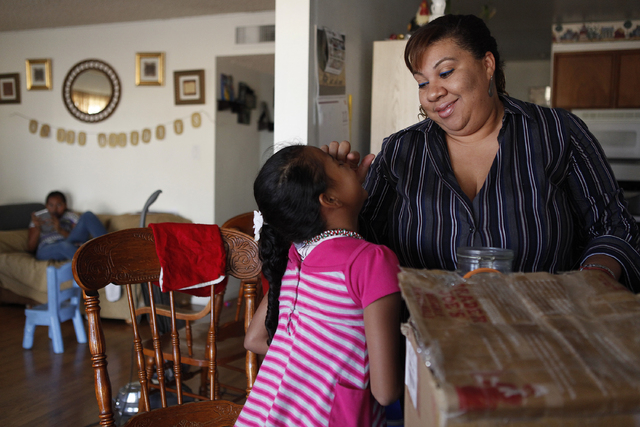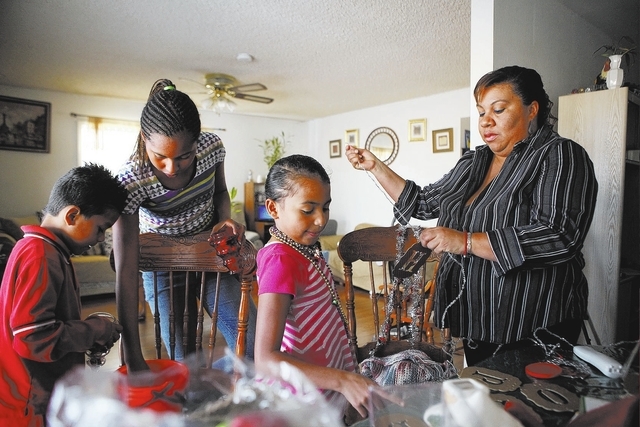With benefits on the block, jobless Nevadans face uncertainty
WASHINGTON — Sofia Banks has been looking for work in Las Vegas since November 2012 when she was laid off from her job as assistant manager at a discount store. On her weekly unemployment check of $327, she supports herself, three children and her mother.
Banks and her children, a 12-year-old and 7-year-old twins, collect cans, cardboard and other recycling on the weekend for small amounts of cash. She apportions meals knowing she can’t afford to feed the youngsters three times a day. It’s tough, she said. And she fears it might get tougher.
Sofia and thousands of other Nevadans who have been out of work, some longer than a year, have reason to feel unsettled going into the holidays. Federal funding for long-term jobless benefits expires a few days after Christmas, and Congress has yet to decide whether they should be extended.
Banks, 36, attends vocational school to become certified as a medical assistant. She said a sudden cutoff in benefits likely means she will have to quit school, and consider selling her car to make her $950 rent in January.
“It’s a snowball effect,” she said. “I’m in school full time now to get myself back in the workforce, but my options are pretty much where I will have to let go of school and join back into whatever I fall into, which still won’t put me into being able to support myself and my kids.”
“My car maybe isn’t even worth a thousand dollars,” she said.
ABRUPT END TO CHECKS
Some 17,600 Nevadans who have been out of work for more than six months would lose benefits when the Emergency Unemployment Compensation program runs out Dec. 28. There is no phase-out. The checks would just end.
And as new or recently unemployed persons go into the new year and exhaust their 26 weeks of payments, there would be no federal extension.
By June, another 21,900 Nevadans would be entirely off benefits.
“It will be a dead stop for these people unless Congress acts,” said Kelly Karch, deputy administrator of the state Employment Security Division. The average weekly check is $314.
Karch said the outlook for those job-seekers would be “terrible” since Nevada’s 9.3 percent unemployment rate remains the highest in the nation, and jobs are scarce.
The federal benefits kick in after job-seekers exhaust their state-paid unemployment payments. Uncle Sam funds various tiers of benefits beyond 26 weeks, to a maximum 73 weeks in the hardest hit states. That distinction is held by Nevada and Illinois, according to the Center for Budget and Policy Priorities.
“Nevada is set to lose more weeks than any state in the nation,” said Josh Drobnyk, a Democratic staffer on the House Ways and Means Committee.
Nationwide, 1.3 million people still are collecting extended benefits, which were scaled back earlier this year from 99 weeks in the hardest-hit states.
Congress has wrestled with the unemployment safety net since emergency payments were authorized in June 2008, as the nation was sinking into recession.
Karch noted that this is the “fifth or sixth time” in recent years that Congress could go to the brink over whether to continue the emergency benefits. In the past, the extensions always have been approved, but at times not until after the deadline had passed.
As a result, he said the Employment Security Division would ask recipients to keep filing for benefits throughout January in case Congress misses the Dec. 28 cutoff but retroactively passes an extension.
CONGRESSIONAL DEADLINES LOOM
As members of Congress prepare to go home for the holidays, jobless benefits are one of the issues on the table as House and Senate budget leaders negotiate a year-end deal to keep the government open when the latest temporary spending law expires Jan. 15.
Democrats reportedly are seeking a year’s extension of extended jobless benefits, at an estimated cost of $20 billion to $25 billion. There is a chance Congress won’t complete a deal by Friday, which Speaker John Boehner, R-Ohio, has set as the final day of the House session.
Boehner told reporters Thursday he was open to an extension but put the onus on Democrats to come up with a plan.
“If the president has a plan for extending unemployment, I’ll take a look at it,” Boehner said.
Some Republicans question whether the program should be renewed, pointing to the expense and that the economy has improved since 2008. The national jobless rate fell from 7.3 percent in October to 7 percent in November, the Labor Department reported Friday.
“The benefits were passed by this Congress five years ago as emergency spending, an emergency need, at a time in which we were facing near bottom in terms of our economy,” House Majority Leader Eric Cantor, R-Va. said Thursday.
“I would say that such policies, if we were to continue, would lead to greater federal deficit, which would eventually reduce the nation’s output and income slightly below what would occur under current law,” Cantor said.
But national employment numbers that are encouraging mask stubborn economic woes in Nevada, which has led the nation in joblessness in every month but one since May 2010.
Karch said the state last week paid federal benefits to 16,747 people, along with paying state unemployment benefits to another 28,372 people.
That is far fewer than three years ago when as many as 140,000 people received federal and state benefits. At the peak, 75,000 people were receiving federal emergency benefits for long-term jobless.
NO EASY ROAD TO EXTENSION
For that reason, Nevada lawmakers have tended to favor extending benefits, although it might not be a slam dunk for some this time.
Democratic Rep. Steven Horsford was drawing a line in the sand. He said he will vote against any budget bill that does not address the jobless benefits, and will vote against sending the House home for Christmas if no agreement is reached this week.
“We should not adjourn without this issue being dealt with,” Horsford said. “Why would we leave this issue unaddressed at a time when we are going into the holiday and people need the security? Just the emotional stress that people are going through from being unemployed let alone going into the holidays and knowing you can’t meet your obligations come January.”
Democratic Rep. Dina Titus said cutting off jobless benefits could halt the recovery.
“Everyone tells me the economy is turning around, but then you start throwing cold water on something that is moving in the right direction,” she said.
Republican Rep. Joe Heck supports extending the benefits and was signing a letter with like-minded Republicans urging GOP leaders to reach a deal, spokesman Greg Lemon said.
Sen. Dean Heller, R-Nev., has supported extensions in the past, according to spokeswoman Chandler Smith. A 2011 bill he sponsored would have extended payments for a year, and paid for them by cutting unobligated funds elsewhere in the budget.
“As the budget negotiations continue, Sen. Heller will closely examine any resulting legislation that affects these programs in light of what is best for Nevada,” Smith said.
Republican Rep. Mark Amodei was taking a close look at the numbers of Nevadans receiving unemployment compensation, how many are opening new claims each week, and how much is being spent per week, spokesman Brian Baluta said Friday.
“Any decision Mark makes will take into account that adding to the federal deficit and debt harms the economy in the both near and long term and does not get Americans back to work,” Baluta said.
Amodei voted for extensions in the past, most recently in August 2012. But he voted against the most recent extension in January that was wrapped into a budget and tax deal that he believed was unhealthy on the whole.
A report last week by the Congressional Budget Office concluded extending the benefits would benefit the economy. It would put more money into the pockets of job-seekers to spend on consumer goods that would in turn spur companies to hire more workers, it said.
How big of an economic benefit was uncertain. The CBO estimated it could increase employment anywhere from “very slightly” to as many as 300,000 jobs.
And unless the spending is offset by cuts elsewhere, the CBO noted extending jobless benefits would increase the deficit.
On the other hand, it said, the cash would prompt some unemployed people to “reduce the intensity of their job search and remain unemployed longer.”
Contact Stephens Washington Bureau Chief Steve Tetreault at stetreault@stephensmedia.com or 202-783-1760. Follow him on Twitter @STetreaultDC. Contact Capital Bureau Chief Ed Vogel at evogel@reviewjournal.com or 775-687-3901. Follow him on Twitter @edison vogel.




















